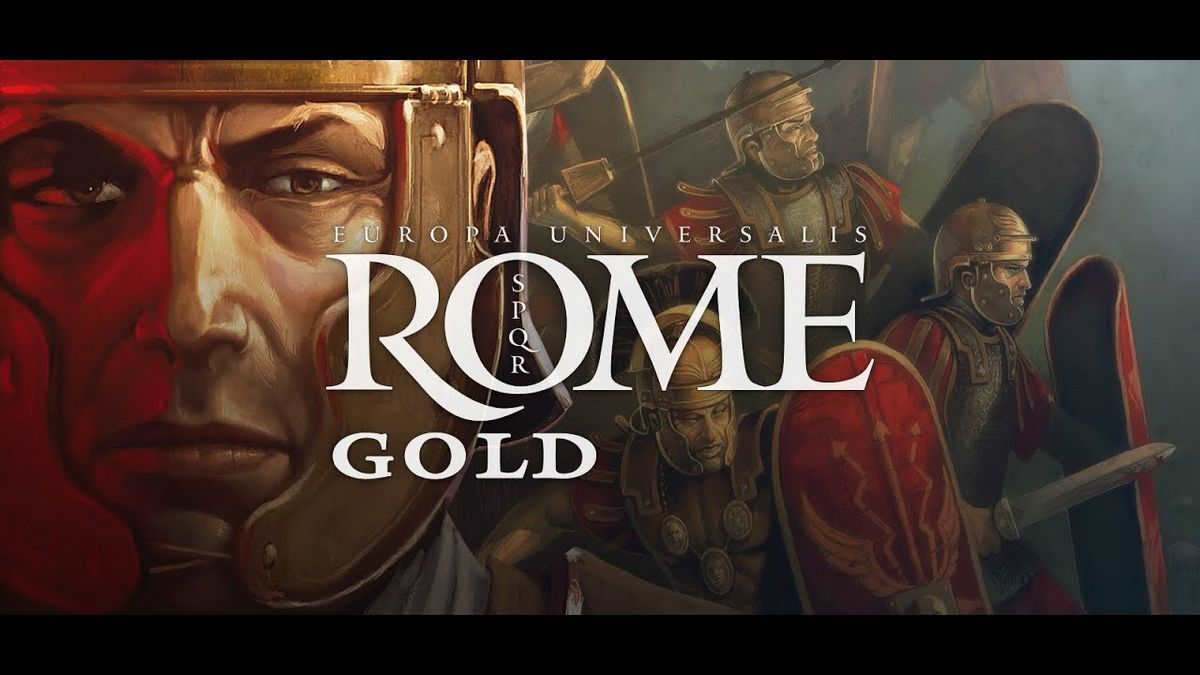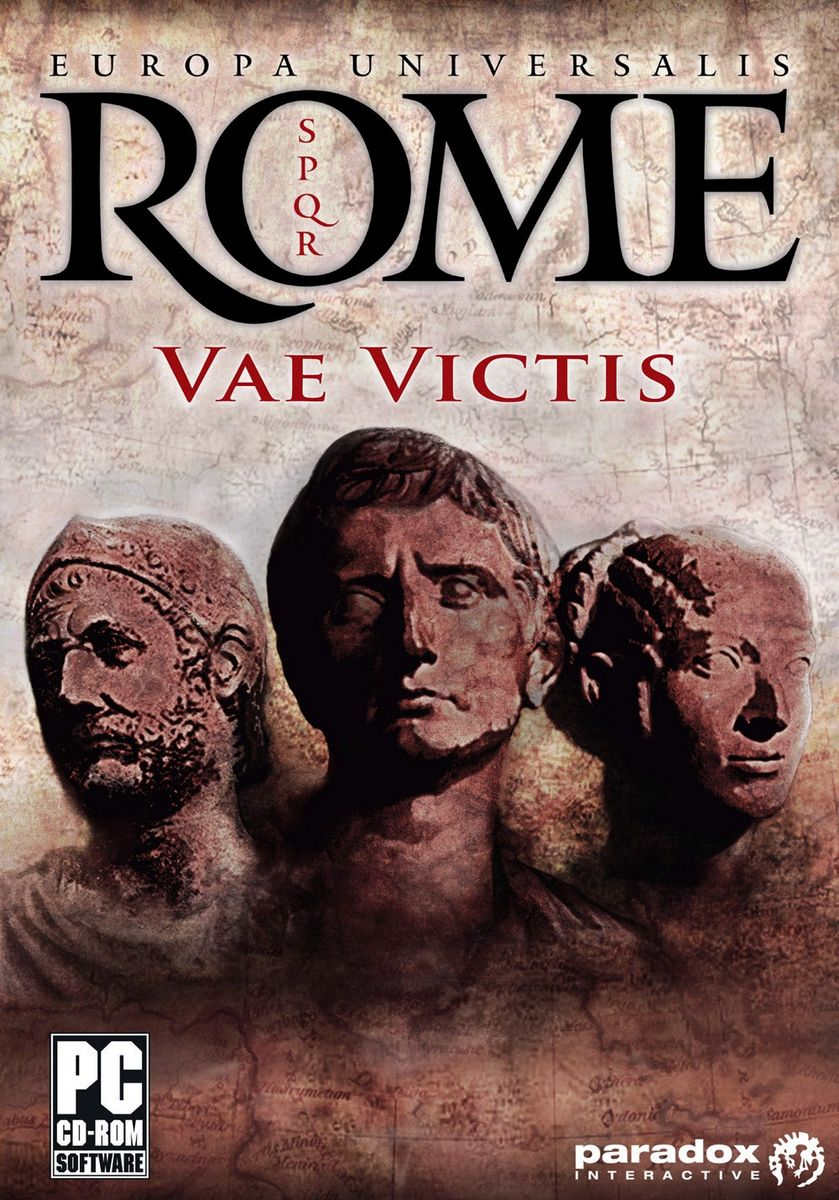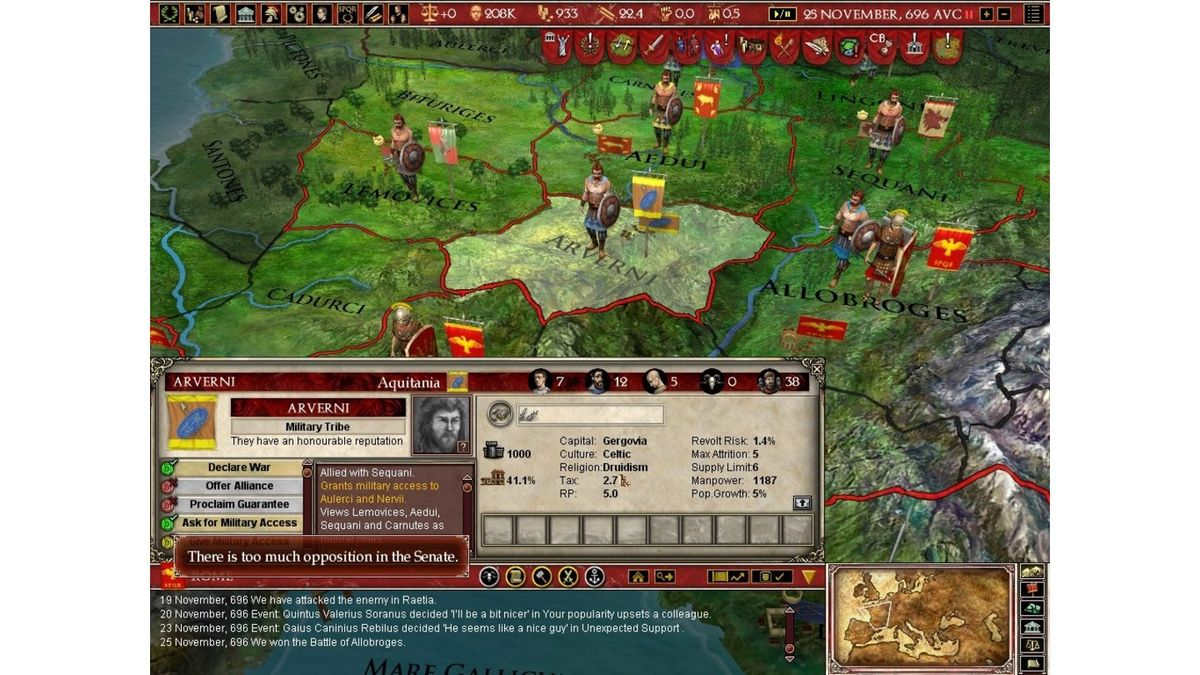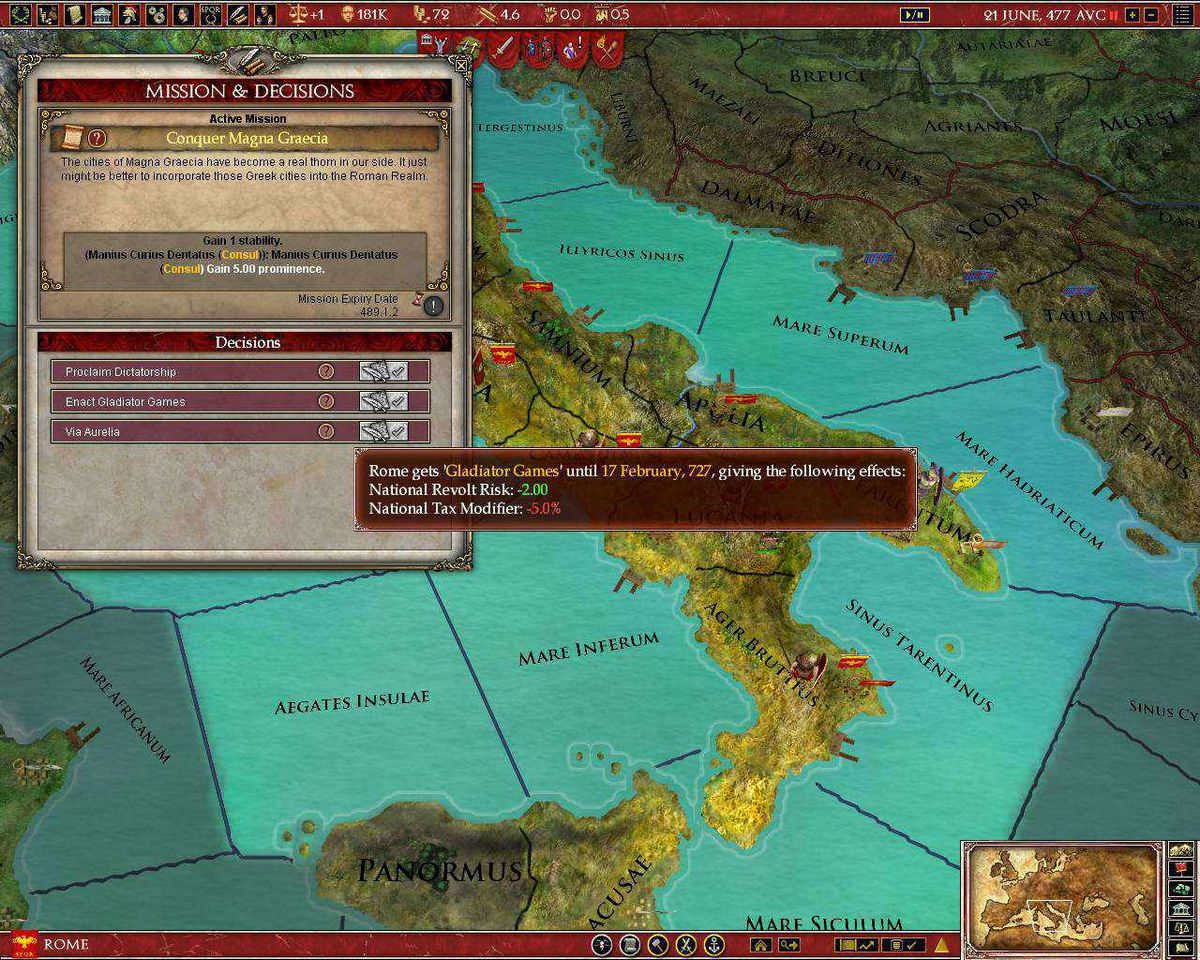Europa Universalis: Rome – Vae Victis is a grand strategy game that was released in 2008 by Paradox Development Studio. It is the first expansion pack for Europa Universalis: Rome, which immerses players into the world of ancient Rome and allows them to lead their empire to victory. This expansion brings new features such as characters and traits, government types, cultures, missions, and events that add depth and complexity to an already engaging gameplay experience.
As a strategic thinker who wants to conquer the Roman Empire with your military might or diplomatic prowess, you must navigate through various challenges such as rebellions from local tribes, invasions from neighboring empires like Carthage or Greece, political infighting within your own government system while dealing with external threats. The game requires careful planning and execution of strategies based on economic stability, cultural assimilation policies towards conquered territories while keeping track of historical timelines accurately.
With unparalleled attention to detail in its presentation of ancient civilizations’ politics and warfare mechanics combined with complex AI systems controlling opponents who follow logical patterns rather than randomly attacking makes this game stand out among other grand strategy games. Whether you are a history buff looking for immersive gameplay experiences or someone interested in mastering intricate strategizing skills needed for success in modern-day business environments – Europa Universalis: Rome – Vae Victis offers something for everyone!
- Understanding the Political and Military Mechanics of Europa Universalis: Rome – Vae Victis
- Exploring the Economic System in Europa Universalis: Rome – Vae Victis
- Strategies for Conquering Europe in Europa Universalis: Rome – Vae Victis
- Diplomacy, Alliances, and Espionage in Europa Universalis: Rome – Vae Victis
- The Role of Religion and Culture in Europa Universalis: Rome – Vae Victis
- Analyzing Historical Accuracy in Europa Universalis: Rome – Vae Victi
- Maximizing Trade Routes to Boost Your Empire’s Wealth in EU:Rome- Ve Vic
- Tackling Late Game Challenges In EU-Rome with Improved AI & More Complex Mechanics
Understanding the Political and Military Mechanics of Europa Universalis: Rome – Vae Victis
The game mechanics are designed to replicate the political and military dynamics of ancient Rome, from the sprawling power struggles between provincial governors to the complex alliances and betrayals that defined international relations in the Mediterranean world.
One of the key features of Europa Universalis: Rome – Vae Victis is its focus on politics. Players must carefully manage their relationships with other factions, balancing alliances and rivalries to maintain stability within their own empire while also ensuring they have enough diplomatic leverage to assert themselves on the global stage. This involves everything from negotiating treaties and marriages to assassinating rivals or inciting rebellions against enemy powers.
At the same time, players must also be skilled military strategists. From building up formidable armies and navies to deploying them effectively on land or sea battles, war plays a central role in shaping events in Europa Universalis: Rome – Vae Victis. With nuanced combat systems that take factors like terrain, morale, supply lines into account, players will need both tactical skills as well as sound strategic planning if they hope to achieve victory over their foes.
Overall, understanding the political and military mechanics of Europa Universalis: Rome – Vae Victis requires an appreciation for both history and strategy gaming. By mastering these elements through careful study and playtesting strategies repeatedly until you find what works best for your particular empire’s strengths/weaknesses; one can create an impressive virtual Roman Empire that would make even Caesar himself proud!

Exploring the Economic System in Europa Universalis: Rome – Vae Victis
The game puts players at the helm of their own empire, tasking them with managing resources, building infrastructure, and expanding their territory through trade or military conquest.
One of the core aspects of Europa Universalis: Rome – Vae Victis’ economic system is its emphasis on resource management. Players must carefully balance their production to ensure they have enough food, raw materials, and luxury goods to sustain their people while also meeting demands for trade. This requires careful planning and strategic decision-making as players must determine which resources are most valuable based on supply and demand.

Another critical element of the economic system in Europa Universalis: Rome – Vae Victis is taxation. As much as resource management plays a crucial role in maintaining an empire’s economy, keeping taxes appropriately set can make or break an empire’s financial stability. Setting taxes too high may lead to unrest among your population while setting them too low can quickly drain your treasury.
Overall, Europa Universalis: Rome – Vae Victis offers an immersive experience into the complex world of Ancient Roman economics. It challenges players to think critically about how they manage resources and finances while also providing insight into how these principles impacted one of history’s most significant empires.
Strategies for Conquering Europe in Europa Universalis: Rome – Vae Victis
The objective of the game is to conquer Europe and become the ultimate ruler of the continent. To achieve this goal, players must employ a range of strategies and tactics.
One effective approach is to focus on expansion early on in the game. This involves conquering neighboring territories and building up your army and resources quickly. Players should also pay close attention to diplomacy, forging alliances with other factions or making enemies as necessary.
Another crucial factor in dominating Europe is managing resources effectively. Players must gather wealth by developing trade routes, constructing buildings, and exploiting natural resources such as mines or forests. It’s essential to balance economic growth with military expansion, investing in infrastructure while simultaneously maintaining a strong army.
In addition to these core strategies, it’s important for players to adapt their tactics depending on their opponents’ strengths and weaknesses. For example, if facing an enemy with powerful cavalry units, it may be wise to invest in spearmen or archers instead of relying solely on infantry troops.
Overall, mastering Europa Universalis: Rome – Vae Victis requires strategic planning, quick thinking under pressure, and careful resource management. By employing these key strategies consistently throughout gameplay – along with adapting them based on changing circumstances – players can successfully conquer Europe and emerge victorious as rulers of ancient Rome!
Diplomacy, Alliances, and Espionage in Europa Universalis: Rome – Vae Victis
Diplomacy is the art of negotiation between nations to achieve common goals or resolve conflicts peacefully. In the game, players can engage in diplomatic relations with other empires to form alliances or declare war.
Alliances play a vital role in shaping the geopolitical landscape of Europa Universalis: Rome – Vae Victis. By forging strong bonds with neighboring empires through military pacts or royal marriages, players can secure their borders against external threats and gain strategic advantages over rivals. However, maintaining alliances requires careful management of relationships and constant attention to changing circumstances on the world stage.
Espionage is another critical aspect of gameplay that allows players to gather information about enemy territories and sabotage their plans covertly. By recruiting spies and setting them on various missions such as stealing technology or inciting rebellions, players can weaken opponents from within without risking open warfare.
Overall, diplomacy, alliances, and espionage are essential tools for any player seeking dominance in Europa Universalis: Rome – Vae Victis. Successful implementation of these strategies requires patience and skillful negotiations based on historical precedents while keeping an eye on opportunities for expansionism at all times.
The Role of Religion and Culture in Europa Universalis: Rome – Vae Victis

Religion served as an organizing principle around which various factions coalesced, while culture was used to differentiate between different groups and define their identities. In this context, understanding the role of religion and culture is crucial for players looking to succeed in the game.
Religion plays a particularly important role in Europa Universalis: Rome – Vae Victis because it affects both domestic politics and foreign relations. Players must navigate complex religious conflicts within their own territories while also managing relationships with neighboring states that may have different faiths. Failure to do so could lead to rebellion or invasion by religiously motivated enemies.
Culture, on the other hand, is closely tied to identity politics in the game. Different cultures have unique strengths and weaknesses that can be leveraged for military or economic advantage, but they can also lead to internal unrest if not managed properly. For example, players who conquer new territories must take care not to impose their own culture too strongly on conquered peoples lest they spark rebellions or uprisings.
In short, understanding religion and culture is essential for success in Europa Universalis: Rome – Vae Victis. Players who are able to effectively manage these factors will be better positioned to navigate complex political landscapes and emerge victorious against their foes.
Analyzing Historical Accuracy in Europa Universalis: Rome – Vae Victi
The game’s emphasis on historical accuracy makes it an excellent tool for learning about this period in history. However, as with any work of historical fiction, there are bound to be inaccuracies.
One way in which Europa Universalis: Rome – Vae Victi maintains historical accuracy is through its use of actual historical figures and events. Players can choose from a variety of factions based on real-life civilizations like Carthage or the Roman Republic. Additionally, important figures such as Julius Caesar make appearances throughout the game.
However, some aspects of gameplay may not align perfectly with what actually happened in history. For example, while the game allows players to conquer territories and expand their empire using military force as they did historically, it does not account for factors such as disease or natural disasters that could have played a role in shaping events at that time.
Overall though, Europa Universalis: Rome – Vae Victi provides an immersive experience into ancient civilization while also doing its best to maintain accurate representations of real-life events and people from this era.
Maximizing Trade Routes to Boost Your Empire’s Wealth in EU:Rome- Ve Vic
Players must carefully consider the geographical location of their territories and strategically establish trade routes with neighboring regions. In addition, they can invest in technologies that improve trading capabilities, such as roads and harbors.
A successful trade route requires a steady flow of goods from the source to destination markets. Players may need to build infrastructure or negotiate favorable terms with other nations to ensure a reliable supply chain. Moreover, it’s crucial to keep an eye on changing market conditions and adapt accordingly.
In order to maximize profits, players should also focus on acquiring rare and valuable resources that can be sold at premium prices in distant markets. This requires scouting nearby regions for potential sources of lucrative commodities like gold or silk and establishing profitable relations with local rulers or merchants.
Overall, maximizing trade routes plays a critical role in building a prosperous empire in EU:Rome – Ve Vic. By leveraging geographic advantages, investing in infrastructure and technology, negotiating favorable deals with other nations, and pursuing high-value resources players can secure long-term success for their economies.
Tackling Late Game Challenges In EU-Rome with Improved AI & More Complex Mechanics
Late game challenges refer to the political, military, economic, and social issues that players encounter as they progress through the later stages of the game. These issues arise due to a combination of factors such as expanding empires, resource depletion, increasing complexity of governance structures, and competing interests.
One effective way to tackle these late-game challenges is by improving AI capabilities. The use of advanced algorithms will enable non-player characters (NPCs) to make better decisions that reflect their individual personalities and priorities. This will add realism to interactions between players and NPCs while also creating new strategic possibilities.
Another approach is introducing more complex mechanics into the gameplay experience. For instance, resource management can be made more challenging by adding scarcity or by requiring players to balance multiple resources simultaneously. Additionally, events like epidemics or natural disasters could be introduced which affect various aspects of empire management including diplomacy and trade routes.
In conclusion, tackling late-game challenges in EU-Rome requires both technical improvements like improved AI capabilities but also creative solutions such as innovative mechanics designed for greater immersion in historical periods leading up until 14 AD Rome reigns supreme!

In conclusion, the Europa Universalis: Rome – Vae Victis game is an exceptional strategy game that offers players a unique gameplay experience. The game’s historical accuracy and attention to detail sets it apart from other games in its genre, providing players with a chance to immerse themselves in the ancient Roman world.
The addition of new mechanics such as characters and government types adds more depth and complexity to the gameplay, making each playthrough feel unique and challenging. The expansion pack also introduces new challenges for experienced players while still being accessible enough for newcomers.
Overall, Europa Universalis: Rome – Vae Victis is an excellent choice for fans of strategy games looking for something different than the usual medieval or modern settings. Its historical setting combined with complex gameplay mechanics make this expansion an exciting addition to any gamer’s collection.
Read More:- Conquer the World: Play Europa Universalis III and Rule as a Mighty Empire! (69 characters).
- Experience Life in Medieval Europe with Europa 1400: The Guild Game – Play Now!.
- Conquer Japan's Feudal Era in Nobunaga's Ambition: Rise to Power Game – Unleash your Strategic Prowess!.
- Discover New Realms with Sid Meier's Civilization IV: Beyond the Sword Expansion Pack – Review and Tips.
- Experience the Power of Trade with Patrician III: Rise of the Hanse Game – A Thrilling Adventure!.
- Conquer Your Way Through History with Empire Earth: The Ultimate Strategy Game!.
- Discover the Best Strategies for Dawn of Discovery and Rule Your Empire! (70 characters exactly).